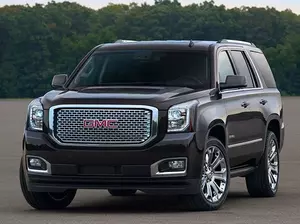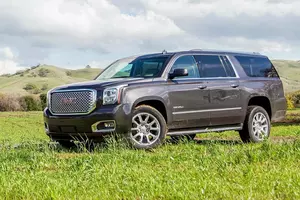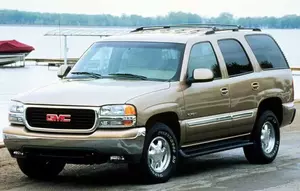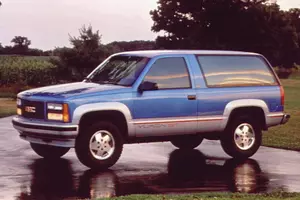
| Vehicle | Precise engine size | Difference from world average | Engine size to consumption ratio | Horsepower from 1 L | Engine size to 100 kg of weight |
|---|---|---|---|---|---|
| 5.3 EcoTec3 V8 |
5.33 L (5328 cc) |
127.1% bigger | - | 67 hp from 1 L | 205 cc to 100 kg |
| Denali 6.2 EcoTec3 V8 |
6.16 L (6162 cc) |
162.7% bigger | - | 68 hp from 1 L | 237 cc to 100 kg |
| Vehicle | 5.3 EcoTec3 V8 |
|---|---|
| Precise engine size | 5.33 L (5328 cc) |
| Difference from world average | 127.1 bigger |
| Engine size to consumption ratio | - |
| Horsepower from 1 L | 67 hp from 1 L |
| Engine size to 100 kg of weight | 205 cc to 100 kg |
| Vehicle | Denali 6.2 EcoTec3 V8 |
| Precise engine size | 6.16 L (6162 cc) |
| Difference from world average | 162.7 bigger |
| Engine size to consumption ratio | - |
| Horsepower from 1 L | 68 hp from 1 L |
| Engine size to 100 kg of weight | 237 cc to 100 kg |

| Vehicle | Precise engine size | Difference from world average | Engine size to consumption ratio | Horsepower from 1 L | Engine size to 100 kg of weight |
|---|---|---|---|---|---|
| 5.3 EcoTec3 V8 |
5.33 L (5328 cc) |
127.1% bigger | - | 67 hp from 1 L | 197 cc to 100 kg |
| Denali 6.2 EcoTec3 V8 |
6.16 L (6162 cc) |
162.7% bigger | - | 68 hp from 1 L | 228 cc to 100 kg |
| Vehicle | 5.3 EcoTec3 V8 |
|---|---|
| Precise engine size | 5.33 L (5328 cc) |
| Difference from world average | 127.1 bigger |
| Engine size to consumption ratio | - |
| Horsepower from 1 L | 67 hp from 1 L |
| Engine size to 100 kg of weight | 197 cc to 100 kg |
| Vehicle | Denali 6.2 EcoTec3 V8 |
| Precise engine size | 6.16 L (6162 cc) |
| Difference from world average | 162.7 bigger |
| Engine size to consumption ratio | - |
| Horsepower from 1 L | 68 hp from 1 L |
| Engine size to 100 kg of weight | 228 cc to 100 kg |

| Vehicle | Precise engine size | Difference from world average | Engine size to consumption ratio | Horsepower from 1 L | Engine size to 100 kg of weight |
|---|---|---|---|---|---|
| 5.3 i V8 16V |
5.33 L (5327 cc) |
127.1% bigger | - | 60 hp from 1 L | 213 cc to 100 kg |
| 2500 6.0 VVT V8 16V |
5.97 L (5967 cc) |
154.3% bigger | - | 59 hp from 1 L | 213 cc to 100 kg |
| Denali 6.2 i V8 16V |
6.16 L (6162 cc) |
162.7% bigger | - | 65 hp from 1 L | 220 cc to 100 kg |
| Vehicle | 5.3 i V8 16V |
|---|---|
| Precise engine size | 5.33 L (5327 cc) |
| Difference from world average | 127.1 bigger |
| Engine size to consumption ratio | - |
| Horsepower from 1 L | 60 hp from 1 L |
| Engine size to 100 kg of weight | 213 cc to 100 kg |
| Vehicle | 2500 6.0 VVT V8 16V |
| Precise engine size | 5.97 L (5967 cc) |
| Difference from world average | 154.3 bigger |
| Engine size to consumption ratio | - |
| Horsepower from 1 L | 59 hp from 1 L |
| Engine size to 100 kg of weight | 213 cc to 100 kg |
| Vehicle | Denali 6.2 i V8 16V |
| Precise engine size | 6.16 L (6162 cc) |
| Difference from world average | 162.7 bigger |
| Engine size to consumption ratio | - |
| Horsepower from 1 L | 65 hp from 1 L |
| Engine size to 100 kg of weight | 220 cc to 100 kg |

| Vehicle | Precise engine size | Difference from world average | Engine size to consumption ratio | Horsepower from 1 L | Engine size to 100 kg of weight |
|---|---|---|---|---|---|
| Denali 6.2 i V8 16V |
6.16 L (6162 cc) |
162.7% bigger | - | 62 hp from 1 L | 246 cc to 100 kg |
| 6.0 V8 16V |
5.97 L (5967 cc) |
154.3% bigger | - | 56 hp from 1 L | 213 cc to 100 kg |
| 4.8 i V8 16V |
4.81 L (4807 cc) |
104.9% bigger | - | 61 hp from 1 L | 200 cc to 100 kg |
| 5.3 i V8 16V |
5.33 L (5328 cc) |
127.1% bigger | - | 60 hp from 1 L | 222 cc to 100 kg |
| Vehicle | Denali 6.2 i V8 16V |
|---|---|
| Precise engine size | 6.16 L (6162 cc) |
| Difference from world average | 162.7 bigger |
| Engine size to consumption ratio | - |
| Horsepower from 1 L | 62 hp from 1 L |
| Engine size to 100 kg of weight | 246 cc to 100 kg |
| Vehicle | 6.0 V8 16V |
| Precise engine size | 5.97 L (5967 cc) |
| Difference from world average | 154.3 bigger |
| Engine size to consumption ratio | - |
| Horsepower from 1 L | 56 hp from 1 L |
| Engine size to 100 kg of weight | 213 cc to 100 kg |
| Vehicle | 4.8 i V8 16V |
| Precise engine size | 4.81 L (4807 cc) |
| Difference from world average | 104.9 bigger |
| Engine size to consumption ratio | - |
| Horsepower from 1 L | 61 hp from 1 L |
| Engine size to 100 kg of weight | 200 cc to 100 kg |
| Vehicle | 5.3 i V8 16V |
| Precise engine size | 5.33 L (5328 cc) |
| Difference from world average | 127.1 bigger |
| Engine size to consumption ratio | - |
| Horsepower from 1 L | 60 hp from 1 L |
| Engine size to 100 kg of weight | 222 cc to 100 kg |

| Vehicle | Precise engine size | Difference from world average | Engine size to consumption ratio | Horsepower from 1 L | Engine size to 100 kg of weight |
|---|---|---|---|---|---|
| 4.8 V8 |
4.81 L (4807 cc) |
104.9% bigger | - | 57 hp from 1 L | 209 cc to 100 kg |
| 5.3 V8 |
5.33 L (5327 cc) |
127.1% bigger | - | 53 hp from 1 L | - |
| 1500 6.0 V8 |
5.97 L (5967 cc) |
154.3% bigger | - | 54 hp from 1 L | 259 cc to 100 kg |
| 2500 6.0 V8 |
5.97 L (5967 cc) |
154.3% bigger | - | 54 hp from 1 L | - |
| Vehicle | 4.8 V8 |
|---|---|
| Precise engine size | 4.81 L (4807 cc) |
| Difference from world average | 104.9 bigger |
| Engine size to consumption ratio | - |
| Horsepower from 1 L | 57 hp from 1 L |
| Engine size to 100 kg of weight | 209 cc to 100 kg |
| Vehicle | 5.3 V8 |
| Precise engine size | 5.33 L (5327 cc) |
| Difference from world average | 127.1 bigger |
| Engine size to consumption ratio | - |
| Horsepower from 1 L | 53 hp from 1 L |
| Engine size to 100 kg of weight | - |
| Vehicle | 1500 6.0 V8 |
| Precise engine size | 5.97 L (5967 cc) |
| Difference from world average | 154.3 bigger |
| Engine size to consumption ratio | - |
| Horsepower from 1 L | 54 hp from 1 L |
| Engine size to 100 kg of weight | 259 cc to 100 kg |
| Vehicle | 2500 6.0 V8 |
| Precise engine size | 5.97 L (5967 cc) |
| Difference from world average | 154.3 bigger |
| Engine size to consumption ratio | - |
| Horsepower from 1 L | 54 hp from 1 L |
| Engine size to 100 kg of weight | - |

| Vehicle | Precise engine size | Difference from world average | Engine size to consumption ratio | Horsepower from 1 L | Engine size to 100 kg of weight |
|---|---|---|---|---|---|
| 1500 5.3 V8 |
5.33 L (5327 cc) |
127.1% bigger | - | 53 hp from 1 L | 232 cc to 100 kg |
| 2500 6.0 V8 |
5.97 L (5967 cc) |
154.3% bigger | - | 53 hp from 1 L | 259 cc to 100 kg |
| 1500 6.0 V8 |
5.97 L (5967 cc) |
154.3% bigger | - | 53 hp from 1 L | 259 cc to 100 kg |
| 1500 Denali 6.0 V8 |
5.97 L (5967 cc) |
154.3% bigger | - | 54 hp from 1 L | - |
| 2500 Denali 6.0 V8 |
5.97 L (5967 cc) |
154.3% bigger | - | 54 hp from 1 L | - |
| 2500 8.1 V8 |
8.14 L (8135 cc) |
246.8% bigger | - | 42 hp from 1 L | - |
| Vehicle | 1500 5.3 V8 |
|---|---|
| Precise engine size | 5.33 L (5327 cc) |
| Difference from world average | 127.1 bigger |
| Engine size to consumption ratio | - |
| Horsepower from 1 L | 53 hp from 1 L |
| Engine size to 100 kg of weight | 232 cc to 100 kg |
| Vehicle | 2500 6.0 V8 |
| Precise engine size | 5.97 L (5967 cc) |
| Difference from world average | 154.3 bigger |
| Engine size to consumption ratio | - |
| Horsepower from 1 L | 53 hp from 1 L |
| Engine size to 100 kg of weight | 259 cc to 100 kg |
| Vehicle | 1500 6.0 V8 |
| Precise engine size | 5.97 L (5967 cc) |
| Difference from world average | 154.3 bigger |
| Engine size to consumption ratio | - |
| Horsepower from 1 L | 53 hp from 1 L |
| Engine size to 100 kg of weight | 259 cc to 100 kg |
| Vehicle | 1500 Denali 6.0 V8 |
| Precise engine size | 5.97 L (5967 cc) |
| Difference from world average | 154.3 bigger |
| Engine size to consumption ratio | - |
| Horsepower from 1 L | 54 hp from 1 L |
| Engine size to 100 kg of weight | - |
| Vehicle | 2500 Denali 6.0 V8 |
| Precise engine size | 5.97 L (5967 cc) |
| Difference from world average | 154.3 bigger |
| Engine size to consumption ratio | - |
| Horsepower from 1 L | 54 hp from 1 L |
| Engine size to 100 kg of weight | - |
| Vehicle | 2500 8.1 V8 |
| Precise engine size | 8.14 L (8135 cc) |
| Difference from world average | 246.8 bigger |
| Engine size to consumption ratio | - |
| Horsepower from 1 L | 42 hp from 1 L |
| Engine size to 100 kg of weight | - |

| Vehicle | Precise engine size | Difference from world average | Engine size to consumption ratio | Horsepower from 1 L | Engine size to 100 kg of weight |
|---|---|---|---|---|---|
| 7.4 i V8 |
7.45 L (7446 cc) |
217.4% bigger | - | 39 hp from 1 L | - |
| 5.7 i V8 |
5.73 L (5733 cc) |
144.4% bigger | - | 45 hp from 1 L | 249 cc to 100 kg |
| Vehicle | 7.4 i V8 |
|---|---|
| Precise engine size | 7.45 L (7446 cc) |
| Difference from world average | 217.4 bigger |
| Engine size to consumption ratio | - |
| Horsepower from 1 L | 39 hp from 1 L |
| Engine size to 100 kg of weight | - |
| Vehicle | 5.7 i V8 |
| Precise engine size | 5.73 L (5733 cc) |
| Difference from world average | 144.4 bigger |
| Engine size to consumption ratio | - |
| Horsepower from 1 L | 45 hp from 1 L |
| Engine size to 100 kg of weight | 249 cc to 100 kg |

| Vehicle | Precise engine size | Difference from world average | Engine size to consumption ratio | Horsepower from 1 L | Engine size to 100 kg of weight |
|---|---|---|---|---|---|
| 6.5d V8 Turbo |
6.47 L (6473 cc) |
175.9% bigger | - | 28 hp from 1 L | - |
| 5.7 V8 |
5.74 L (5735 cc) |
144.5% bigger | - | 37 hp from 1 L | - |
| Vehicle | 6.5d V8 Turbo |
|---|---|
| Precise engine size | 6.47 L (6473 cc) |
| Difference from world average | 175.9 bigger |
| Engine size to consumption ratio | - |
| Horsepower from 1 L | 28 hp from 1 L |
| Engine size to 100 kg of weight | - |
| Vehicle | 5.7 V8 |
| Precise engine size | 5.74 L (5735 cc) |
| Difference from world average | 144.5 bigger |
| Engine size to consumption ratio | - |
| Horsepower from 1 L | 37 hp from 1 L |
| Engine size to 100 kg of weight | - |